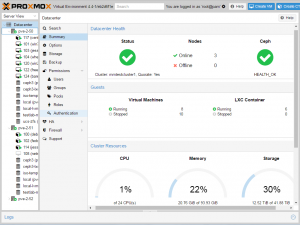Main Page: Difference between revisions
(New structure) |
|||
| Line 7: | Line 7: | ||
'''Proxmox Virtual Environment''' is an open source server virtualization management solution based on QEMU/KVM and LXC. You can manage virtual machines, containers, highly available clusters, storage and networks with an integrated, easy-to-use web interface or via CLI. Proxmox VE code is licensed under the GNU Affero General Public License, version 3. The project is developed and maintained by [http://www.proxmox.com/ Proxmox Server Solutions GmbH]. | '''Proxmox Virtual Environment''' is an open source server virtualization management solution based on QEMU/KVM and LXC. You can manage virtual machines, containers, highly available clusters, storage and networks with an integrated, easy-to-use web interface or via CLI. Proxmox VE code is licensed under the GNU Affero General Public License, version 3. The project is developed and maintained by [http://www.proxmox.com/ Proxmox Server Solutions GmbH]. | ||
For an overview of the main Proxmox VE features see the [http://www.proxmox.com/proxmox-ve/features datasheet]. | |||
=Reference Documentation= | =Downloads= | ||
[[Downloads | Download]] our latest ISO image. | |||
=Installation= | |||
You can install Proxmox VE either on your hardware from USB or CD-ROM using our ISO image, or alternatively on top of an existing Debian installation. | |||
[http://pve.proxmox.com/wiki/Installation Read more >] | |||
= Using Proxmox VE = | |||
This wiki includes the complete [[:Category:Reference Documentation|Proxmox VE Reference Documentation]]. | |||
If you are new to Proxmox VE the following chapters will help you to start: | |||
* [[Qemu/KVM Virtual Machines]] and [[Proxmox Container Toolkit|LXC]] are the two types of virtualization technologies supported by Proxmox VE | |||
* [[Host System Administration]] will detail all the tasks commonly done on the Proxmox VE host such as setting [[Package Repositories]], [[Network Configuration]], [[System Software Updates]], [[External Metric Server]], [[Disk Health Monitoring]], [[Logical Volume Manager (LVM)]], [[ZFS on Linux]] | |||
* [[Cluster Manager]] will explain you how to group your Proxmox VE hosts in clusters | |||
* once you have setup a cluster, you can configure [[High Availability]] for your virtual machines and containers. | |||
* [[Storage]] will give you an overview of all the supported storages in Proxmox VE: [[Ceph Server]], [[Storage: GlusterFS]], [[Storage: User Mode iSCSI]], [[Storage: iSCSI]], [[Storage: LVM]], [[Storage: LVM Thin]], [[Storage: NFS]], [[Storage: RBD]], [[Storage: ZFS]], [[Storage: ZFS over iSCSI]] | |||
* [[Backup and Restore]] will explain how to use the integrated backup manager | |||
* [[Firewall]] details how the built-in Proxmox VE Firewall works | |||
* [[User Management]] explains how the authentication and permissions work in Proxmox VE | |||
* finally, the [[Developer Documentation]] will show you how to get access to the source code, and how to send patches so your work will be included in the next Proxmox VE release | |||
=Offline Documentation= | |||
The complete [[:Category:Reference Documentation|Proxmox VE Reference Documentation]] is also available offline in different formats such as html, pdf, epub at http://pve.proxmox.com/pve-docs/ | |||
This | This documentation is also included in each PVE installation, and is accessible via contextual help buttons. | ||
=HOWTOs & Troubleshooting= | =HOWTOs & Troubleshooting= | ||
| Line 21: | Line 44: | ||
;[[:Category:Troubleshooting|Troubleshooting]] | ;[[:Category:Troubleshooting|Troubleshooting]] | ||
: What to do if something fails | : What to do if something fails | ||
</div> | </div> | ||
=Release History and Roadmap= | =Release History and Roadmap= | ||
Take a look on the [[Roadmap]] for upcoming features. | Take a look on the [[Roadmap]] for upcoming features. | ||
= | =Video Tutorials= | ||
Proxmox VE | For new Proxmox VE users, we regularly publish video tutorials on our website, see http://www.proxmox.com/training/video-tutorials. | ||
=Testimonials= | =Testimonials= | ||
7,500+ companies, universities, public institutions and NGOs use Proxmox VE in production environment. Take a look on our [http://www.proxmox.com/proxmox-ve/testimonials testimonials] page. | |||
</td> | </td> | ||
Revision as of 12:52, 24 May 2017
|
Today, 21 November 2024, there are 247 articles available. Proxmox Virtual Environment is an open source server virtualization management solution based on QEMU/KVM and LXC. You can manage virtual machines, containers, highly available clusters, storage and networks with an integrated, easy-to-use web interface or via CLI. Proxmox VE code is licensed under the GNU Affero General Public License, version 3. The project is developed and maintained by Proxmox Server Solutions GmbH. For an overview of the main Proxmox VE features see the datasheet. DownloadsDownload our latest ISO image. InstallationYou can install Proxmox VE either on your hardware from USB or CD-ROM using our ISO image, or alternatively on top of an existing Debian installation. Using Proxmox VEThis wiki includes the complete Proxmox VE Reference Documentation. If you are new to Proxmox VE the following chapters will help you to start:
Offline DocumentationThe complete Proxmox VE Reference Documentation is also available offline in different formats such as html, pdf, epub at http://pve.proxmox.com/pve-docs/ This documentation is also included in each PVE installation, and is accessible via contextual help buttons. HOWTOs & Troubleshooting
Release History and RoadmapTake a look on the Roadmap for upcoming features. Video TutorialsFor new Proxmox VE users, we regularly publish video tutorials on our website, see http://www.proxmox.com/training/video-tutorials. Testimonials7,500+ companies, universities, public institutions and NGOs use Proxmox VE in production environment. Take a look on our testimonials page. |
